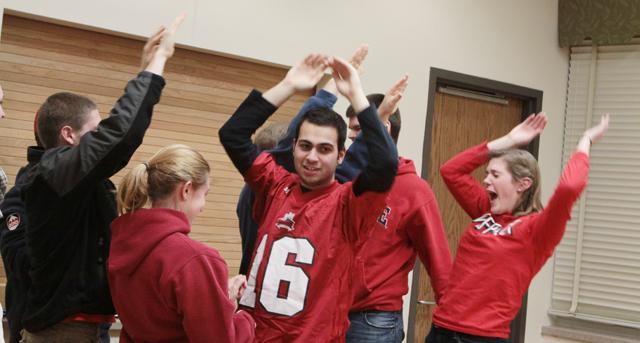Generally when 24 students are in a room working together to complete an assignment, it is in a classroom setting. For 24 Quad residents, it’s for a residence hall program.
Nathan Combs, a senior in mathematics, said Quad Survivor is a program where students who live in the Quad can compete against each other in a Survivor-style game.
“The game works similar to the show, just without the outdoor aspect,” Combs said. “Players compete in challenges for rewards or Immunity, which keeps players safe from being voted out of the game at Tribal Council. Eventually, only one person remains and will claim the prize at the end.”
Combs, the president of the Quad Area Council, said he was thinking of ideas for programs last semester, and although he is not a huge fan of the show Survivor, he thought a lot of people would get involved due to its competitive nature.
“I did sign ups last semester so I would know how many people would play, and I planned out the format of the program over break. Although no QAC money has gone into the program yet, I plan to request funds to pay for the prize and for a few challenges,” Combs said.
While some of the challenges will be physical and some mental, many will combine both elements, according to Combs.
“A few will even involve social aspects, just like the game itself. The first challenge was held on Sunday and required the tribes to run to different stations where they had to answer questions involving logic, word play and picture puzzles,” Combs said. “Then, once all three stations were completed, they had to solve one final Sudoku puzzle.”
Combs said that although he cannot reveal what challenges the teams will be doing later on, there will be some inspired by actual challenges used on the show.
Also similar to the show is the idea of Tribal Council, which will work similar to the way it works on the show, according to Combs.
“The contestants that must attend show up at a designated time, and I grill them a little bit on the game, their strategies, etc. Then they go up to the voting booth one-by-one and write down the name of the person they want out of the game, then put it in the voting urn. If someone cannot attend, they can always e-mail me their vote beforehand and I write it down and put it in the urn myself,” Combs said. “Afterward, I read the votes, and the person with the most is eliminated from the game.”
Since the University does not allow fire indoors, where Tribal Council takes place, instead of a torch, each player makes a banner to represent their life in the game. Once a player is voted out, Combs said he shreds the banner.
Combs said he came up with most of the challenges himself, using ideas he has seen on the show before, but he has also had help.
“Ultimately, I decide what challenges are used and when they will occur. We’ve only held [two] challenge so far, but I intend to have people helping me judge the challenge outcomes — particularly ones where players may protest the results,” Combs said.
According to Combs, it would be great to see other hall councils implement the idea of Survivor.








